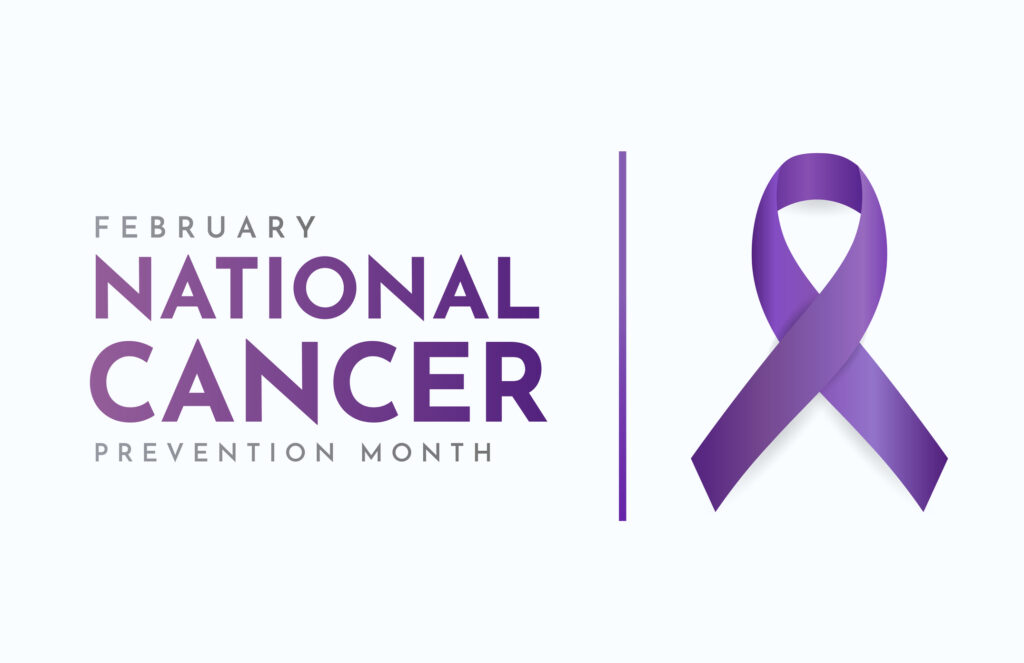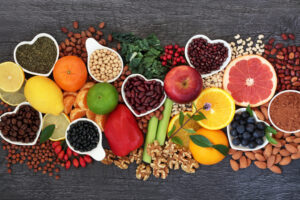National Cancer Prevention Month-marked every February- is upon us, ushering in yet another opportunity to spread the word and take action in order to live better, healthier, and happier lives. Cancer, said to be the world’s leading cause of death, caused nearly 10 million deaths in 2020.
NATIONAL CANCER PREVENTION MONTH Question:
Why does cancer happen?
It results from changes in D.N.A. When abnormal cells become uncontrollable in any part of the body and invade other tissues, cancer happens.
HOW TO OBSERVE NATIONAL CANCER PREVENTION MONTH
Cut the statistics:
One-third of cancers can be prevented. Take action by embracing healthy living: avoid tobacco, cut down on alcohol, maintain a healthy weight and exercise, limit your radiation exposure, and get vaccinated.
5 IMPORTANT FACTS ABOUT CANCER
- Early detection and screening are key
Cancer is deadly, but the good news is thousands of cancer cases, and deaths can be prevented through early detection and screening.
- Cancer is a leading cause of death
In 2019, cancer was said to be the world’s second leading cause of death, with breast (2.26 million cases) and lung (2.21 million cases) being the most common types of cancer, according to the WHO.
- Cancer research has decreased death rates
More effective cancer treatment has decreased the death rate according to the American Cancer Society and, more specifically, lung cancer.
- Smoking increases your risk of lung cancer
The most effective preventative measure against the disease is to stop smoking. The more cigarettes you smoke, the higher your risk. - February 4 marks World Cancer Day
Founded in 2000 and led by the Union for International Cancer Control (U.I.C.C.), the day aims to increase global awareness about cancer and save many from suffering and death
Diet and physical activity recommendations
Changes to the guideline include recommendations for getting more physical activity, eating less (or no) processed and red meat, and avoiding alcohol or drinking less. It says:
- Get to and stay at a healthy body weight throughout life. If you’re overweight or obese, losing even a few pounds can lower your risk for some types of cancer.
- Adults should get 150-300 minutes of moderate-intensity physical activity per week, or 75-150 minutes of vigorous-intensity physical activity, or a combination. Getting 300 minutes or even more will give you the most health benefits.
- Children and teens should get at least 1 hour of moderate or vigorous intensity activity each day.
- Spend less time sitting or lying down. This includes time looking at your phone, tablet, computer, or TV.
- Eat a colorful variety of vegetables and fruits, and plenty of whole grains and brown rice.
- Avoid or limit eating red meats such as beef, pork, and lamb and processed meats such as bacon, sausage, deli meats, and hot dogs.
- Avoid or limit sugar-sweetened beverages, highly processed foods, and refined grain products.
- It is best not to drink alcohol. But if you do, women should have no more than 1 drink per day and men should have no more than 2. A drink is 12 ounces of regular beer, 5 ounces of wine, or 1.5 ounces of 80-proof distilled spirits.
According to Laura Makaroff, DO, American Cancer Society senior vice president:
Prevention and Early Detection, the guideline is based on current science that shows that how you eat, rather than specific foods or nutrients, is important in reducing the risk of cancer and boosting overall health.
“There is no one food or even food group that is adequate to achieve a significant reduction in cancer risk,” Makaroff said. People should eat whole foods, not individual nutrients, she said, because evidence continues to suggest that healthy dietary patterns are associated with reduced risk for cancer, especially colorectal and breast cancers.
National Cancer Prevention Month-marked every February- is upon us, ushering in yet another opportunity to spread the word and take action in order to live better, healthier, and happier lives. Cancer, said to be the world’s leading cause of death, caused nearly 10 million deaths in 2020.
NATIONAL CANCER PREVENTION MONTH Question:
Why does cancer happen?
It results from changes in D.N.A. When abnormal cells become uncontrollable in any part of the body and invade other tissues, cancer happens.
HOW TO OBSERVE NATIONAL CANCER PREVENTION MONTH
Cut the statistics:
One-third of cancers can be prevented. Take action by embracing healthy living: avoid tobacco, cut down on alcohol, maintain a healthy weight and exercise, limit your radiation exposure, and get vaccinated.
5 IMPORTANT FACTS ABOUT CANCER
- Early detection and screening are key
Cancer is deadly, but the good news is thousands of cancer cases, and deaths can be prevented through early detection and screening.
- Cancer is a leading cause of death
In 2019, cancer was said to be the world’s second leading cause of death, with breast (2.26 million cases) and lung (2.21 million cases) being the most common types of cancer, according to the WHO.
- Cancer research has decreased death rates
More effective cancer treatment has decreased the death rate according to the American Cancer Society and, more specifically, lung cancer.
- Smoking increases your risk of lung cancer
The most effective preventative measure against the disease is to stop smoking. The more cigarettes you smoke, the higher your risk. - February 4 marks World Cancer Day
Founded in 2000 and led by the Union for International Cancer Control (U.I.C.C.), the day aims to increase global awareness about cancer and save many from suffering and death
Diet and physical activity recommendations
Changes to the guideline include recommendations for getting more physical activity, eating less (or no) processed and red meat, and avoiding alcohol or drinking less. It says:
- Get to and stay at a healthy body weight throughout life. If you’re overweight or obese, losing even a few pounds can lower your risk for some types of cancer.
- Adults should get 150-300 minutes of moderate-intensity physical activity per week, or 75-150 minutes of vigorous-intensity physical activity, or a combination. Getting 300 minutes or even more will give you the most health benefits.
- Children and teens should get at least 1 hour of moderate or vigorous intensity activity each day.
- Spend less time sitting or lying down. This includes time looking at your phone, tablet, computer, or TV.
- Eat a colorful variety of vegetables and fruits, and plenty of whole grains and brown rice.
- Avoid or limit eating red meats such as beef, pork, and lamb and processed meats such as bacon, sausage, deli meats, and hot dogs.
- Avoid or limit sugar-sweetened beverages, highly processed foods, and refined grain products.
- It is best not to drink alcohol. But if you do, women should have no more than 1 drink per day and men should have no more than 2. A drink is 12 ounces of regular beer, 5 ounces of wine, or 1.5 ounces of 80-proof distilled spirits.
According to Laura Makaroff, DO, American Cancer Society senior vice president:
Prevention and Early Detection, the guideline is based on current science that shows that how you eat, rather than specific foods or nutrients, is important in reducing the risk of cancer and boosting overall health.
“There is no one food or even food group that is adequate to achieve a significant reduction in cancer risk,” Makaroff said. People should eat whole foods, not individual nutrients, she said, because evidence continues to suggest that healthy dietary patterns are associated with reduced risk for cancer, especially colorectal and breast cancers.






